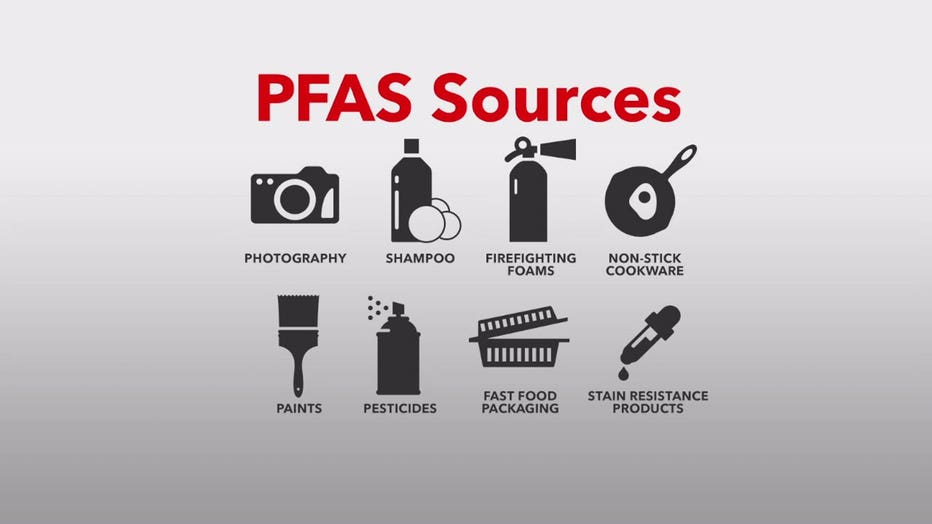Republicans allow Wisconsin PFAS standards to take effect
PFAS
MADISON, Wis. - Wisconsin Republicans will allow regulations Democratic Gov. Tony Evers' administration developed to control pollution from a group of chemicals known as PFAS to take effect, a spokesman for the lawmaker who controls the Legislature's rules committee said Monday.
The Legislature's Republican-controlled Joint Committee for Review of Administrative Reviews has no objections to the regulations and will allow the Department of Natural Resources to implement them, said Mike Mikalsen, an aide to the committee's co-chairman, Sen. Steve Nass.
Mikalsen warned that the committee could suspend the standards if the department doesn’t lawfully implement them, but for now, at least, the decision marks a rare Republican concession to Evers and hands him something of a victory heading into the November elections.
SIGN UP TODAY: Get daily headlines, breaking news emails from FOX6 News
Since taking office in 2019, Evers has been working to limit contamination from PFAS, an abbreviation for perfluoroalkyl and polyfluoroalkyl substances. The chemicals, found in products ranging from cookware to firefighting foam, don't break down in nature and have been linked to health problems in humans and animals.
A number of Wisconsin communities are wrestling with PFAS in their groundwater, including Marinette, Madison, Marshfield, Wausau and the towns of Peshtigo and Campbell.

The Department of Natural Resources, which Evers controls, has been working on restrictions on PFAS in state waters since September 2019. The department submitted limits on two PFAS compounds, perfluorooctanesulfonic acid (PFOS) and perfluorooctanoic acid (PFOA), to its policy board earlier this year.
Opponents, including Wisconsin Manufacturers and Commerce, the state's largest business group, have balked at the regulations' price tag. The DNR has projected that compliance options such as drilling new wells and installing treatment systems could cost the wastewater treatment and paper mill industries millions of dollars.
The department's board in February ultimately adopted a 70 parts per trillion standard for drinking water and an 8 ppt standard for most surface waters that can support fish. Those standards are designed to limit the amount of PFAS that can be discharged into state waters and in municipal water systems. The board scrapped plans for setting groundwater standards at 2 ppt, leaving well water unregulated.
FREE DOWNLOAD: Get breaking news alerts in the FOX6 News app for iOS or Android.
"The finalization of these water quality protections is a positive development and a necessary step to protect Wisconsinites from forever chemicals," said Tony Wilkin Gibart, executive director of environmental law firm Midwest Environmental Advocates. "While we are glad to see these rules move forward, we are mindful that Wisconsinites whose water comes from private wells also deserve the same protections under our state's groundwater law."
Democratic Attorney General Josh Kaul sued Johnson Controls and Tyco Fire Products in March alleging the companies’ firefighting foam led to contamination in the Marinette area. A Waukesha County judge in April ruled that the Department of Natural Resources couldn’t regulate PFAS pollution because the agency hadn’t established any standards for the chemicals under the state's spills law.
It wasn't immediately clear what impact established standards would have on those cases. A state Department of Justice spokeswoman and representatives of Johnson Controls and Tyco didn't immediately respond to messages Monday.

Wisconsin Manufacturers and Commerce spokesman Nick Novak said the new rules would have no impact on the Waukesha County case. He didn't explain why and didn't immediately respond to a follow-up message seeking more details.
Wisconsin Manufacturers and Commerce alleges in that case that the Department of Natural Resources has never defined PFAS as hazardous substances under Wisconsin's spills law, which requires polluters to clean up their spills. It argues the department has been illegally relying on that law to regulate PFAS.
The drinking water and surface water standards fall under a different set of statutes that aren't in dispute. Implementing them ensures the department has at least some authority to regulate the chemicals regardless of the spills law.
Department spokeswoman Sarah Hoye declined to comment, citing the ongoing litigation.

